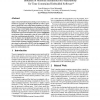Free Online Productivity Tools
i2Speak
i2Symbol
i2OCR
iTex2Img
iWeb2Print
iWeb2Shot
i2Type
iPdf2Split
iPdf2Merge
i2Bopomofo
i2Arabic
i2Style
i2Image
i2PDF
iLatex2Rtf
Sci2ools
142
Voted
CORR
2007
Springer
2007
Springer
Influence of Memory Hierarchies on Predictability for Time Constrained Embedded Software
Safety-criticalembeddedsystems having to meet real-time constraints are to be highlypredictable in order to guarantee at design time that certain timing deadlines will always be met. Thisrequirementusuallypreventsdesignersfrom utilizing cachesdue to their highly dynamic,thus hardlypredictable The integration of scratchpad memories represents analternativeapproachwhichallowsthe systemto a performancegain comparable to that of caches while at the same time maintaining predictability. In this work, we compare the impact of scratchpad memories and caches on worst case execution time (WCET) anulysis results. We show that caches,despite requiring complex techniques, can have a negative impact on thepredicted while the WCET for scratchpadmemories scales with the achievedPerformance gain at no extra analysis cost.
Certain Timing Deadlines | CORR 2007 | Education | Scratchpad Memories | Worst Case Execution Time |
| Added | 13 Dec 2010 |
| Updated | 13 Dec 2010 |
| Type | Journal |
| Year | 2007 |
| Where | CORR |
| Authors | Lars Wehmeyer, Peter Marwedel |
Comments (0)

